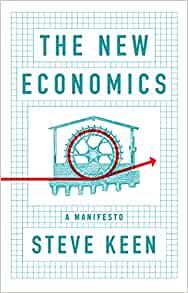Like buses, books about the state of economics seem to come along together. Tomorrow sees the publication of my latest, Cogs and Monsters: What Economics Is and What It Should Be – more on that tomorrow. Do join the launch event if you can.
Meanwhile, I read Steve Keen’s recent book The New Economics: A Manifesto. His focus is far more on macroeconomics than is mine, and some of his arguments (about macrodynamics and Minsky’s insights) will be familiar to readers of his earlier book. This new book also covers the environment: its critique of the Nordhaus approach to integrated modelling, that led to a downplaying of the costs of delaying action against climate change, will find hearty agreement among the environmental economists I know. However, even very mainstream people like Daron Acemoglu have joined the call for a more urgent economics of climate change.
I like the book, which is aimed at students embarking on an economics degree, to open their eyes to the limitations of what they’re likely to be taught. Yet having said that I agree with a lot of the arguments in The New Economics, I don’t share the sense that a monolithic ‘mainstream’ of neoclassical economists is determined to resist change becuase they are bad or stupid people. But then, I don’t regard myself as heterodox, and I’m always keen to point out how much brilliant work is going on in the subject, albeit generally in applied micro, because there’s a lot of misundertaning about what economists generally do. My diagnosis is a combination of not stopping to think and institutional inertia (top 5 journals, promotion criteria, disciplinary silos etc.) But more on my book in tomorrow’s post!


Dear Diane, thank you for a very fair review of my intentionally provocative book.
My publishers have just informed me that a review that is favourable about both our new books will be published in the Financial Times soon: https://www.ft.com/content/a18253be-5819-4d52-a6d3-939a0ab45e4b
Cogs and Monsters and The New Economics — quests for a new model
Two books start with the premise that our present understanding of capitalism is wrong but offer radically different solutions
Felix Martin
I liked it! Thank you for posting the link, Steve.